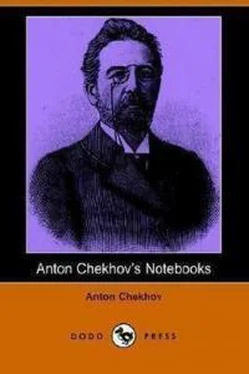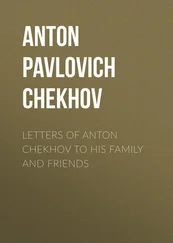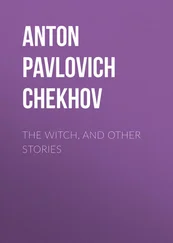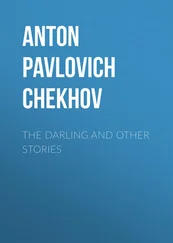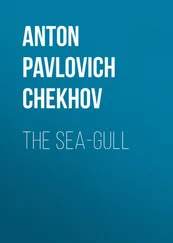Антон Чехов - Notebooks of Anton Chekhov
Здесь есть возможность читать онлайн «Антон Чехов - Notebooks of Anton Chekhov» весь текст электронной книги совершенно бесплатно (целиком полную версию без сокращений). В некоторых случаях можно слушать аудио, скачать через торрент в формате fb2 и присутствует краткое содержание. Год выпуска: 2014, Издательство: epubBooks Classics, Жанр: Биографии и Мемуары, на английском языке. Описание произведения, (предисловие) а так же отзывы посетителей доступны на портале библиотеки ЛибКат.
- Название:Notebooks of Anton Chekhov
- Автор:
- Издательство:epubBooks Classics
- Жанр:
- Год:2014
- ISBN:нет данных
- Рейтинг книги:4 / 5. Голосов: 1
-
Избранное:Добавить в избранное
- Отзывы:
-
Ваша оценка:
- 80
- 1
- 2
- 3
- 4
- 5
Notebooks of Anton Chekhov: краткое содержание, описание и аннотация
Предлагаем к чтению аннотацию, описание, краткое содержание или предисловие (зависит от того, что написал сам автор книги «Notebooks of Anton Chekhov»). Если вы не нашли необходимую информацию о книге — напишите в комментариях, мы постараемся отыскать её.
Notebooks of Anton Chekhov — читать онлайн бесплатно полную книгу (весь текст) целиком
Ниже представлен текст книги, разбитый по страницам. Система сохранения места последней прочитанной страницы, позволяет с удобством читать онлайн бесплатно книгу «Notebooks of Anton Chekhov», без необходимости каждый раз заново искать на чём Вы остановились. Поставьте закладку, и сможете в любой момент перейти на страницу, на которой закончили чтение.
Интервал:
Закладка:
* * * * *
Prostitutes in Monte Carlo, the whole tone is prostitutional; the palm trees, it seems, are prostitutes, and the chickens are prostitutes.
* * * * *
A big dolt, Z., a qualified nurse, of the Petersburg Rozhdestvensky School, having ideals, fell in love with X., a teacher, and believed him to be ideal, a public spirited worker after the manner of novels and stories of which she was so fond. Little by little she found him out, a drunkard, an idler, good–natured and not very clever. Dismissed, he began to live on his wife, sponged on her. He was an excrescence, a kind of sarcoma, who wasted her completely. She was once engaged to attend some intellectual country people, she went to them every day; they felt it awkward to give her money—and, to her great vexation, gave her husband a suit as a present. He would drink tea for hours and this infuriated her. Living with her husband she grew thin, ugly, spiteful, stamped her foot and shouted at him: "Leave me, you low fellow." She hated him. She worked, and people paid the money to him, for, being a Zemstvo worker, she took no money, and it enraged her that their friends did not understand him and thought him ideal.
* * * * *
A young man made a million marks, lay down on them, and shot himself.
* * * * *
"That woman." … "I married when I was twenty; I have not drunk a glass of vodka all my life, haven't smoked a single cigarette." After he had run off with another woman, people got to like him more and to believe him more, and, when he walked in the street, he began to notice that they had all become kinder and nicer to him—because he had fallen.
* * * * *
A man and woman marry because both of them don't know what to do with themselves.
* * * * *
The power and salvation of a people lie in its intellegentsia, in the intellectuals who think honestly, feel, and can work.
* * * * *
A man without a mustache is like a woman with a mustache.
* * * * *
A man who cannot win a woman by a kiss will not win her by a blow.
* * * * *
For one sensible person there are a thousand fools, and for one sensible word there are a thousand stupid ones; the thousand overwhelms the one, and that is why cities and villages progress so slowly. The majority, the mass, always remain stupid; it will always overwhelm; the sensible man should give up hope of educating and lifting it up to himself; he had better call in the assistance of material force, build railways, telegraphs, telephones—in that way he will conquer and help life forward.
* * * * *
Really decent people are only to be found amongst men who have definite, either conservative or radical, convictions; so–called moderate men are much inclined to rewards, commissions, orders, promotions.
* * * * *
"What did your uncle die of?"
"Instead of fifteen Botkin drops, [3] A very harmless purgative.
as the doctor prescribed, he took sixteen."
* * * * *
A young philologist, who has just left the University, comes home to his native town. He is elected churchwarden. He does not believe in God, but goes to church regularly, makes the sign of the cross when passing near a church or chapel, thinking that that sort of thing is necessary for the people and that the salvation of Russia is bound up with it. He is elected chairman of the Zemstvo board and a Justice of the Peace, he wins orders and medals; he does not notice that he has reached the age of forty–five; then suddenly he realizes that all the time he has been acting and making a fool of himself, but it is now too late to change his way of life. Once in his sleep he suddenly hears like the report of a gun the words: "What are you doing?"—and he starts up all in a sweat.
* * * * *
One cannot resist evil, but one can resist good.
* * * * *
He flatters the authorities like a priest.
* * * * *
Instead of sheets—dirty tablecloths.
* * * * *
A Jewish surname: Perchik (little pepper).
* * * * *
A man in conversation: "And all the rest of it."
* * * * *
A rich man, usually insolent, his conceit enormous, but bears his riches like a cross. If the ladies and generals did not dispense charity on his account, if it were not for the poor students and the beggars, he would feel the anguish of loneliness. If the beggars struck and agreed not to beg from him, he would go to them himself.
* * * * *
The husband invites his friends to his country–house in the Crimea, and afterwards his wife, without her husband's knowledge, brings them the bill and is paid for board and lodging.
* * * * *
Potapov becomes attached to the brother, and this is the beginning of his falling in love with the sister. Divorces his wife. Afterwards the son sends him plans for a rabbit–hutch.
* * * * *
"I have sown clover and oats."'
"No good; you had much better sow lucerne."
"I have begun to keep a pig."
"No good. It does not pay. You had better go in for mares."
* * * * *
A girl, a devoted friend, out of the best of motives, went about with a subscription list for X., who was not in want.
* * * * *
Why are the dogs of Constantinople so often described?
* * * * *
Disease: "He has got hydropathy."
* * * * *
I visit a friend, find him at supper; there are many guests. It is very gay; I am glad to chatter with the women and drink wine. A wonderfully pleasant mood. Suddenly up gets N. with an air of importance, as though he were a public prosecutor, and makes a speech in my honor. "The magician of words … ideals … in our time when ideals grow dim … you are sowing wisdom, undying things…." I feel as if I had had a cover over me and that now the cover had been taken off and some one was aiming a pistol at me.
* * * * *
After the speech—a murmur of conversation, then silence. The gayety has gone. "You must speak now," says my neighbor. But what can I say? I would gladly throw the bottle at him. And I go to bed with some sediment in my soul. "Look what a fool sits among you!"
* * * * *
The maid, when she makes the bed, always puts the slippers under the bed close to the wall. The fat master, unable to bear it any longer, gives the maid notice. It turns out that the doctor told her to put the slippers as far as possible under the bed so as to cure the man of his obesity.
* * * * *
The club blackballed a respectable man because all of the members were out of humor; they ruined his prospects.
* * * * *
A large factory. The young employer plays the superior to all and is rude to the employees who have University degrees. Only the gardener, a German, has the courage to be offended: "How dare you, gold bag?"
* * * * *
A tiny little schoolboy with the name of Trachtenbauer.
* * * * *
Whenever he reads in the newspaper about the death of a great man, he wears mourning.
* * * * *
In the theatre. A gentleman asks a lady to take her hat off, as it is in his way. Grumbling, disagreeableness, entreaties. At last a confession: "Madam, I am the author of the play." She answered: "I don't care."
* * * * *
In order to act wisely it is not enough to be wise (Dostoevsky).
* * * * *
A. and B. have a bet. A. wins the wager, by eating twelve cutlets; B. does not pay even for the cutlets.
* * * * *
It is terrible to dine every day with a person who stammers and says stupid things.
* * * * *
Glancing at a plump, appetizing woman: "It is not a woman, it is a full moon."
* * * * *
From her face one would imagine that under her stays she has got gills.
* * * * *
For a farce: Kapiton Ivanovitch Boil.
* * * * *
An income–tax inspector and an excise official, in order to justify their occupations to themselves, say spontaneously: "It is an interesting profession, there is a lot of work, it is a live occupation."
Читать дальшеИнтервал:
Закладка:
Похожие книги на «Notebooks of Anton Chekhov»
Представляем Вашему вниманию похожие книги на «Notebooks of Anton Chekhov» списком для выбора. Мы отобрали схожую по названию и смыслу литературу в надежде предоставить читателям больше вариантов отыскать новые, интересные, ещё непрочитанные произведения.
Обсуждение, отзывы о книге «Notebooks of Anton Chekhov» и просто собственные мнения читателей. Оставьте ваши комментарии, напишите, что Вы думаете о произведении, его смысле или главных героях. Укажите что конкретно понравилось, а что нет, и почему Вы так считаете.
